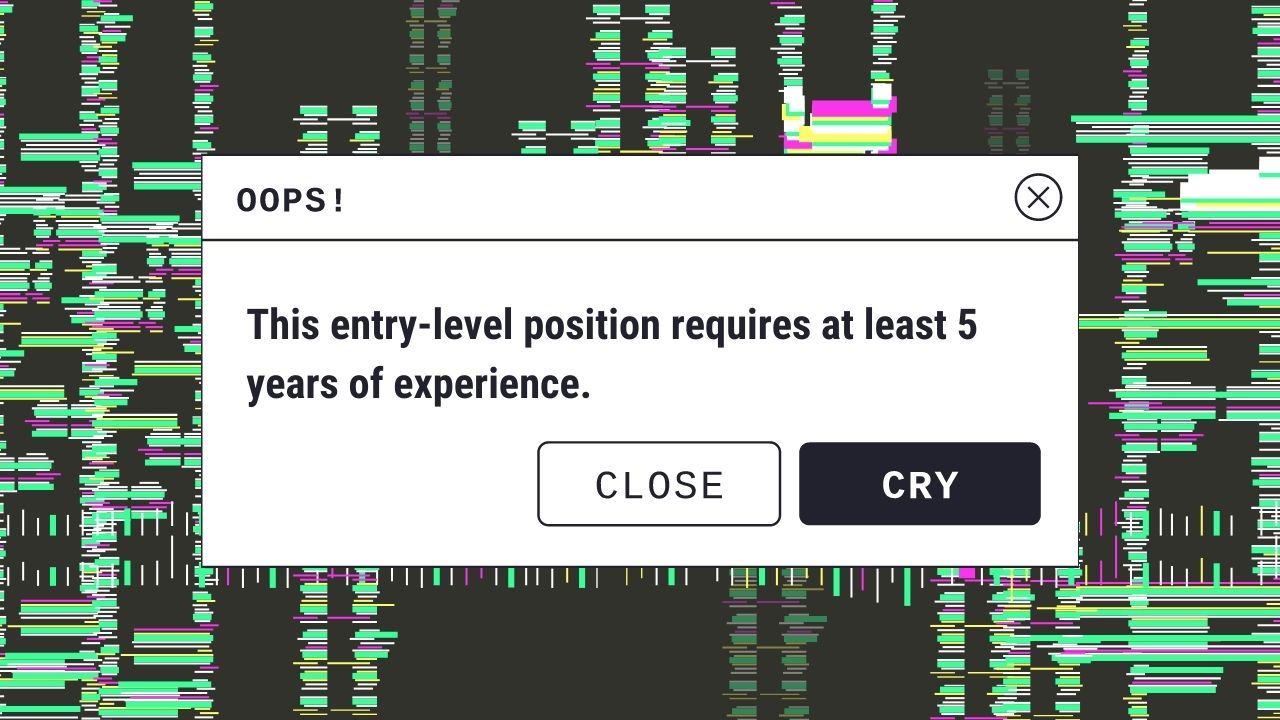- Companies are asking new graduates to already have years of experience before they even apply for entry-level jobs
- As businesses continue to deal with a labor shortage, “experience inflation” might be something that’s driving their inability to fill entry-level positions.
- Entry-level job seekers are most likely to exaggerate their interpersonal skills (47%), job duties (46%), and achievements (45%) on their resumes.
Young professionals seeking entry-level jobs are faced with a huge roadblock; companies are asking new graduates to already have years of experience before they even apply for entry-level jobs, making it more difficult for some young adults to gain a foothold in the labor market.
Although the general thought is that entry-level positions (which are often low-paying) shouldn’t have stringent requirements when it comes to work experience, some entry-level jobs require years of experience, which can be frustrating for job seekers without prior experience in the field.
High experience requirements for entry-level positions isn’t a new problem for job seekers: A study showed that 35% of LinkedIn job postings required three or more years of experience.
More than 60% of listings for entry-level software and IT Services jobs required three or more years of experience. It would seem as though entry-level jobs aren’t for people just entering the workforce.
Entry-level job seekers are struggling to find positions they qualify for, but is this leading them to lie on their resumes?
As businesses continue to deal with a labor shortage, “experience inflation” might be something that’s driving their inability to fill entry-level positions.
In a new study, Skynova surveyed over 1,000 entry-level job seekers and 500 hiring specialists to uncover how much job experience is required for these positions.
Study Highlights:
- Entry-level job seekers estimate that about 55% of listings for entry-level positions required three or more years of related work experience.
- Employers asking for inappropriate levels of required experience is the top job search frustration among entry-level job seekers.
- Nearly 1 in 3 job seekers have a lower opinion of companies that require multiple years of experience for entry-level positions.
- 39% of job seekers feel extremely discouraged by entry-level job postings requiring multiple years of experience—women (42%) and 36-45 year-olds (44%) are most affected.
- Entry-level job seekers are most likely to exaggerate their interpersonal skills (47%), job duties (46%), and achievements (45%) on their resumes.
Entry-level job seekers are frustrated
The survey’s respondents were asked what their biggest frustrations with the job-seeking process were.
The most common response, with nearly half (47%) of respondents marking it as one of their top frustrations, was job listings with inappropriate experience requirements.
Other common frustrations included issues with pay rates, inflexible schedules, and being let down by prospective employers during the application process.
80% of employees said that entry-level jobs shouldn’t require more than two years of experience.
Experience and skill level in a job posting are supposed to attract qualified candidates, and that often means that job seekers are skipping over postings for which they lack skills or experience.
However, some applicants are not so dissuaded. The study showed that 33% of employees were very or extremely likely to apply for an entry-level job when they lacked the skills listed in the description, and 34% said the same when it came to experience listed.
Job seekers were very or extremely likely to exaggerate on their resume (47%) about their interpersonal skills. Educational credentials inspired the most honesty, with nearly a third of job seekers saying they would never exaggerate such information when trying to get a position.
There is a discrepancy between hiring managers and job seekers
The study showed that there are some discrepancies between the perspectives of hirers and job seekers when it comes to the number of entry-level positions that require years of prior experience.
A vast majority (93%) of hiring managers said that their company typically requires fewer than three years of experience for entry-level positions, which is pretty different to job seekers’ estimate that 55% of entry-level positions require three or more years’ experience.
Due to increased hiring difficulties in 2021, some companies changed their policy on requiring prior experience for entry-level positions: 22% hiring managers made such adjustments. Of this number, 63% now require less experience than before.
Companies may be alienating people because of their high expectations
Tactics meant to exclude unqualified applicants have an outsized impact on certain groups, such as newer workers and those with fewer educational credentials.
A large proportion of job postings don’t include a salary range, but expect a vast amount of qualifications from applicants.
When entry-level job seekers aren’t able to land a solid role in their desired field right out of college, it can impact their careers and be incredibly discouraging. In fact, 43% of college graduates don’t have a college-level job in their first job after school.
Better hiring practices might focus on an individual’s accomplishments, characteristics, and potential, rather than just the number of years of prior experience or technical skills on their resume.
Companies may be able to locate the best candidates regardless of their experience level if they adjust their standards for entry-level positions, and in turn, job seekers will have less reason to commit “experience inflation.”

















